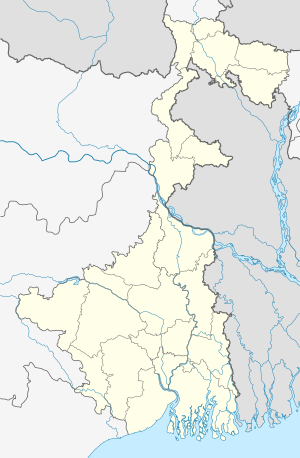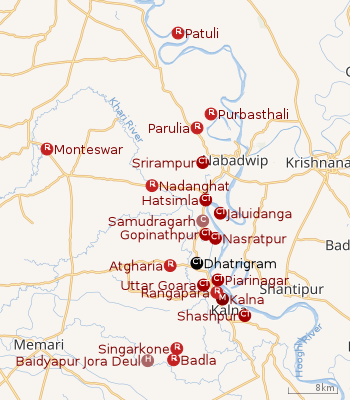Dhatrigram
Dhatrigram is a census town in Kalna I CD Block in Kalna subdivision of Purba Bardhaman district in the state of West Bengal, India.
Dhatrigram | |
|---|---|
Census Town | |
 Dhatrigram Location in West Bengal, India  Dhatrigram Dhatrigram (India) | |
| Coordinates: 23.2956°N 88.3134°E | |
| Country | |
| State | West Bengal |
| District | Purba Bardhaman |
| Area | |
| • Total | 2.6 km2 (1.0 sq mi) |
| Population (2011) | |
| • Total | 9,951 |
| • Density | 3,800/km2 (9,900/sq mi) |
| Languages | |
| • Official | Bengali, English |
| Time zone | UTC+5:30 (IST) |
| PIN | 713405 |
| Vehicle registration | WB |
| Website | purbabardhaman |
History
Dhatrigram responded warmly to the movement against partition of Bengal in 1905. Many people in the town had close links with Kolkata and the liberal trend then affecting the metropolis flowed into this small town for many years.[1]
Geography
 |
| Cities and towns in the Kalna subdivision of Purba Bardhaman district M: municipal city/ town, CT: census town, R: rural/ urban centre, H: historical/ religious centre, C: craft centre. Owing to space constraints in the small map, the actual locations in a larger map may vary slightly |
Location
Dhatrigram is located on the agriculturally rich alluvial plains between the Bhagirathi, Ajay and Damodar rivers.[2] Temperatures in this region varies from 17-18 °C in winter to 30-42 °C in summer.[3]
Urbanisation
87.00% of the population of Kalna subdivision live in the rural areas. Only 13.00% of the population live in the urban areas.[4] The map alongside presents some of the notable locations in the subdivision. All places marked in the map are linked in the larger full screen map.
Demographics
As per the 2011 Census of India Dhatrigram had a total population of 9,951, of which 5,137 (52%) were males and 4,814 (48%) were females. Population below 6 years was 826. The total number of literates in Dhatrigram was 7,704 (84.43% of the population over 6 years).[5]
As of 2001 India census,[6] Dhatrigram had a population of 9,609. Males constitute 52% of the population and females 48%. Dhatrigram has an average literacy rate of 68%, higher than the national average of 59.5%: male literacy is 76% and, female literacy is 60%. In Dhatrigram, 11% of the population is under 6 years of age.
Economy
It is a weaving centre with a name for cotton and silk saris.[7][8]
About 32,00,000 people commute daily from around the city to Kolkata. Thirty-eight trains transport commuters from 45 stations in the Howrah-Katwa section.[9]
Infrastructure
As per the District Census Handbook 2011, Dhatrigram covered an area of 2.6 km2. It had 1.2 km roads. Amongst the medical facilities, the nearest nursing home was 7 km away and the nearest veterinary hospital was 7 km away. It had 2 primary schools. The nearest secondary school was 1.5 km away at Gram Kalna and the nearest senior secondary school was 13 km away at Kalna.[10]
Transport
Dhatrigram railway station is 91 km from Howrah and situated on the Bandel-Katwa Branch Line.[11]
Education
Dhatrigram has many primary and two higher secondary schools
- Dhatrigram High School
- Dhatrigram Balika Vidyalaya
- Gramkalna High School.[12]
Culture
Saraswati & Jagatdhatri Puja is celebrated in Dhatigram and many cultural programmes are held during this occasion.
External links
References
- Chattopadhyay, Akkori, pp. 429-431
- Chattopadhyay, Akkori, Bardhaman Jelar Itihas O Lok Sanskriti (History and Folk lore of Bardhaman District.), (in Bengali) , Vol I, p. 15, Radical Impression. ISBN 81-85459-36-3
- Chattopadhyay, Akkori, p. 19
- "District Statistical Handbook 2014 Bardhaman". Table 2.2. Department of Statistics and Programme Implementation, Government of West Bengal. Retrieved 25 January 2019.
- "2011 Census – Primary Census Abstract Data Tables". West Bengal – District-wise. Registrar General and Census Commissioner, India. Retrieved 28 February 2017.
- "Census of India 2001: Data from the 2001 Census, including cities, villages and towns (Provisional)". Census Commission of India. Archived from the original on 16 June 2004. Retrieved 1 November 2008.
- Chattopadhyay, Akkori, p. 664
- "A Traditional Panorama - Bengal Art". Arts and Crafts in India. India Profile. Retrieved 8 September 2007.
- Dey, Teesta. "The Suburban Railway Network of Kolkata: A Geographical Apprisal" (PDF). eTraverse, the Indian journal of spatial science, 2012. Archived from the original (PDF) on 18 November 2017. Retrieved 23 February 2019.
- "District Census Handbook Bardhaman, Census of India 2011, Series 20, Part XII A" (PDF). Section II Town Directory, Statement I: Growth History, Pages 1179-1181; Statement II: Physical Aspects and Location of Towns, Pages 1188-1191; Statement III: Civic and other Amenities, Pages 1191-1195; Statement IV: Medical Facilities 2009, Pages 1196-1199; Section V: Educational, Recreational and Cultural Facilities 2009, Pages 1200-1209. Directorate of Census Operations V, West Bengal. Retrieved 3 February 2019.
- Railway local time table
- I 7th All-India School Education Survey 2003 Archived 2007-09-27 at the Wayback Machine